After countless nights grappling with keyword research tools, I found myself frustrated, especially when Jaaxy stopped producing the expected QSR results. Anyone who’s tried maintaining multiple websites knows the hassle. You play by the rules, spending hours digging for those hidden gems of low-competition keywords, but the output? Less than stellar. The landscape has changed. So, why is the traditional way lacking?
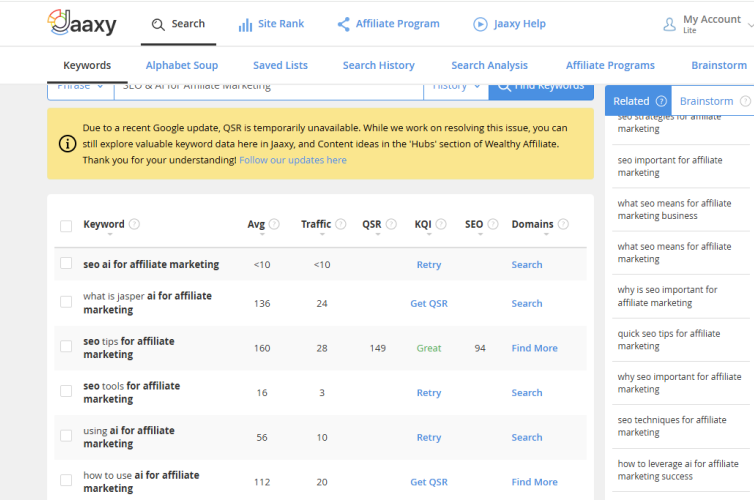
Search engines don’t operate like they used to. We’re in a world where Google adjusts its algorithms frequently, refining how it analyzes content relevance. This means simply finding keywords with potentially less competition isn’t cutting it these days. It’s not about quantity anymore; it’s about relevance and understanding user intent.
So here comes the twist—AI tools are stepping up. They offer predictive insights based on trends, something the old tools couldn’t match. The frustration turned into curiosity, and curiosity led to discovery. Machines learning patterns and behaviors—an idea that seemed straight out of sci-fi is revolutionizing how we marketers find our footing.
But there’s something real and authentically exciting about harnessing such power. AI-managed keyword research didn’t just give me some vague general direction; it opened doors to a plethora of opportunities that my earlier methods missed entirely. AI isn’t just a tool; it’s like having a talented assistant that keeps me ahead of the curve.
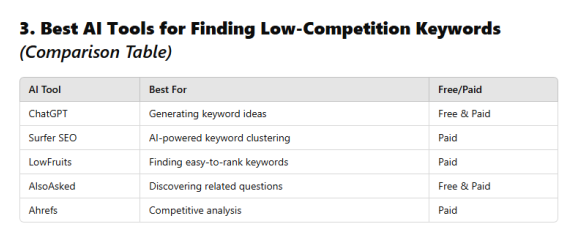
If you’re on the hunt for those low-competition niches and thought sticking to the manual way was your only option, it’s time to rethink. Leveraging AI in your strategy might just be the key to ranking better, getting faster traffic, and improving conversions—without going through the traditional pains.
How AI is Transforming Affiliate Marketing Keyword Strategy
Seeing how far AI has come in the last few years can feel like you’re witnessing a part of the future unfold right before your eyes. In the realm of affiliate marketing, it’s a game-changer. We’ve gone past just entering words into a tool; now, we’re diving into conversation with intelligent systems that understand trends and behaviors on a deeper level.
Take AI tools like ChatGPT, for instance. They aren’t just scrubbing through data but actually learning and adapting from it. This means when you’re reaching out for those low-competition keywords, AI is not just pulling suggestions but analyzing patterns, competitors, and even content gaps that weren’t obvious before. It’s like having an experienced marketing guru whispering insights based on vast, accumulated knowledge.
What makes AI invaluable is how it simplifies a task that used to be incredibly tedious and resource-intensive. Need a batch of potential keywords? ChatGPT has got your back with prompts like ‘Give me 10 low-competition affiliate marketing keywords for travel bloggers.’ You’ve then got a shortlist that would’ve taken much longer to compile manually.
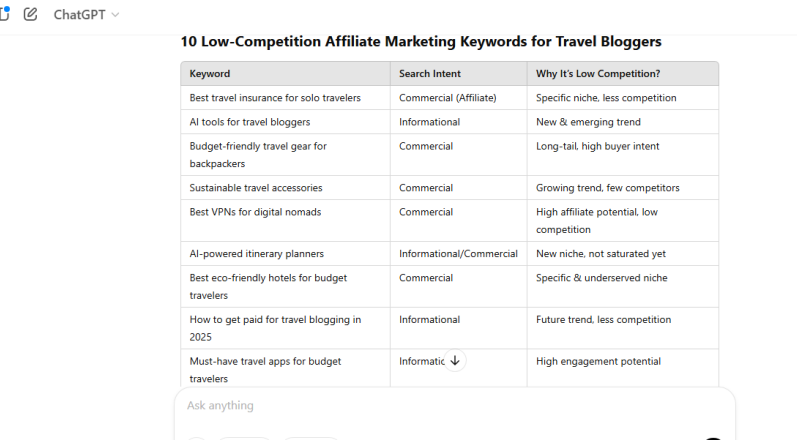
But that’s not all—AI tools shine in automating competitiveness assessments, even offering projections on search volume trends, which can save countless hours of manual labor. This allows you to focus more on crafting quality content that adheres to the E-E-A-T principles, ensuring you stay on top.
With this technology in your toolkit, you’re not just reaching your audience; you’re connecting with them in more meaningful ways. By getting AI to sift through data and present actionable insights, I’ve found it way more impactful than traditional methods. AI’s transformation in keyword strategy? Yeah, it’s one ride you want to be on, especially if better rankings and conversions sound like music to your ears.
Real-Life Guide: Finding Your First Low-Competition Niche
Back when I managed to pull myself out of the frustration rut, I started thinking about where my true interests lay. Personal interests? Sure, they’re crucial, but understanding what your potential audience craves is the real deal. It was about combining passion with strategy, and I found that sweet spot through AI.
Running multiple websites taught me a thing or two about patience and persistence. It’s tempting to jump on trends, but the gold lies in unearthing niches that truly resonate with both your expertise and your readers’ needs. Think of it as more than just finding a set of keywords. It’s understanding the story, the journey your potential readers are on, and how your content can fit into their narratives.
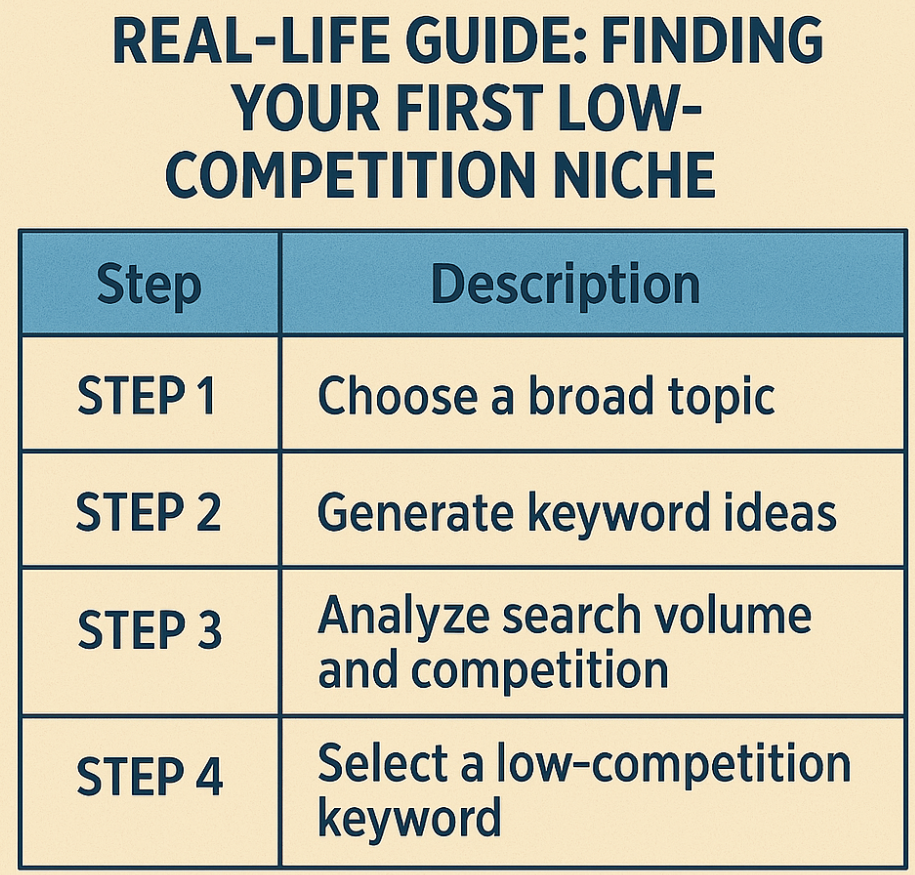 By embracing AI-fueled technology, I discovered niches I hadn’t considered before. The process started with diving deep into areas I genuinely enjoyed, then using AI tools to verify ideas. A magic formula? Not exactly. But when
By embracing AI-fueled technology, I discovered niches I hadn’t considered before. The process started with diving deep into areas I genuinely enjoyed, then using AI tools to verify ideas. A magic formula? Not exactly. But when
AI helps highlight areas of opportunity that align with my interests, it feelspretty magical.
With this approach, I wasn’t just creating content—I was crafting experiences. Experiences that readers found useful, and that, my friend, made all the difference. Real-life guides, sharing personal stories, and offering practical advice based on true experiences? Those were the elements that transformed simple blogs into vibrant, engaging spaces.
When setting off to find your first low-competition niche, it’s this combination of passion and data-driven insight that really sets the stage for success. Lean on technology to point you in promising directions, but never lose sight of what ignites your enthusiasm. When those worlds collide, you’re onto something special.
At the end of the day, it’s crucial to trust in your process. It won’t always be easy, but these efforts make your site not just another drop in the internet ocean, but a genuine hub of value and insight that’s uniquely yours.
AI Tools for Keyword Research: Leveraging Technology to Shortlist Winning Keywords
There’s something undeniably refreshing about having tech do the heavy lifting. With the advent of advanced AI tools, that dream is now a reality. AI technology isn’t just a flashy trend; it’s become a critical ally in the world of affiliate marketing, especially when you’re on the hunt for those elusive low-competition keywords.
One of the real MVPs in this digital game is ChatGPT. The sheer ease of firing up a prompt like, ‘Give me 10 low-competition affiliate marketing keywords for travel bloggers,’ and getting a list of optimized keywords in return is seriously game-changing. It’s like having a bespoke search assistant tuned precisely to your needs.
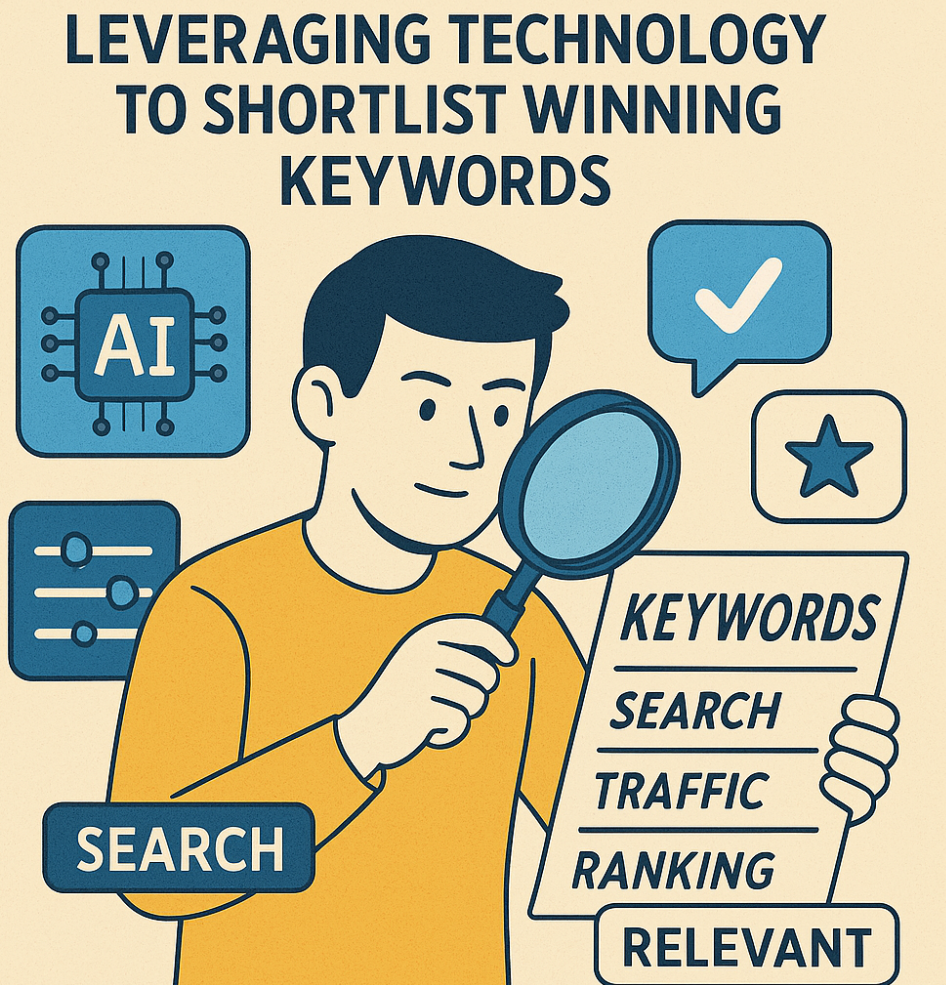
These tools offer more than just fancy lists. They analyze keyword variations and forecast how these could perform over time. This isn’t just guesswork—it’s data-driven insight that can steer you away from common pitfalls that catch many researchers off guard. Understanding search volumes and potential competition right off the bat? Now that’s gold.
It’s easy to overlook potential keyword jams. Everyone wants those golden phrases that promise traffic. But jumping on the bandwagon blindly is a mistake we’ve all been guilty of. AI tools help guide us around these pitfalls by giving us alternative options or variations that are still relevant but less competitive.
Keeping your strategies fresh and adaptable is key—and these AI marvels help make that happen. By relying on their supercharged insight capabilities, I’ve found myself saving precious time. Not just claiming but genuinely owning niches that seemed far-fetched before adapting to this style of keyword research.
Whether you’re just dipping your toes into affiliate marketing or you’re someone seasoned, allowing AI a seat at the table when it comes to developing keyword strategies can only enhance your marketing game. Seize it, and watch as these tools pave smoother paths to affiliate success.
Refining AI-generated Keywords for Maximum Impact
When AI hands you a list of keywords, the journey doesn’t end there. Just because the data suggests something might work, it doesn’t mean you should dive in without second thoughts. It’s about refining, cultivating those suggestions into something that truly fits your brand and audience.
Experience has taught me that analyzing competition and keyword difficulty isn’t just a technical step—it’s essential in shaping a winning strategy. You can’t afford to skip assessing the landscape for each keyword. You need to know what’s already out there and how your content can shine brighter. Tools like Ahrefs or SEMrush can be super helpful here, providing a deeper dive into what it takes to score a top spot on search pages.
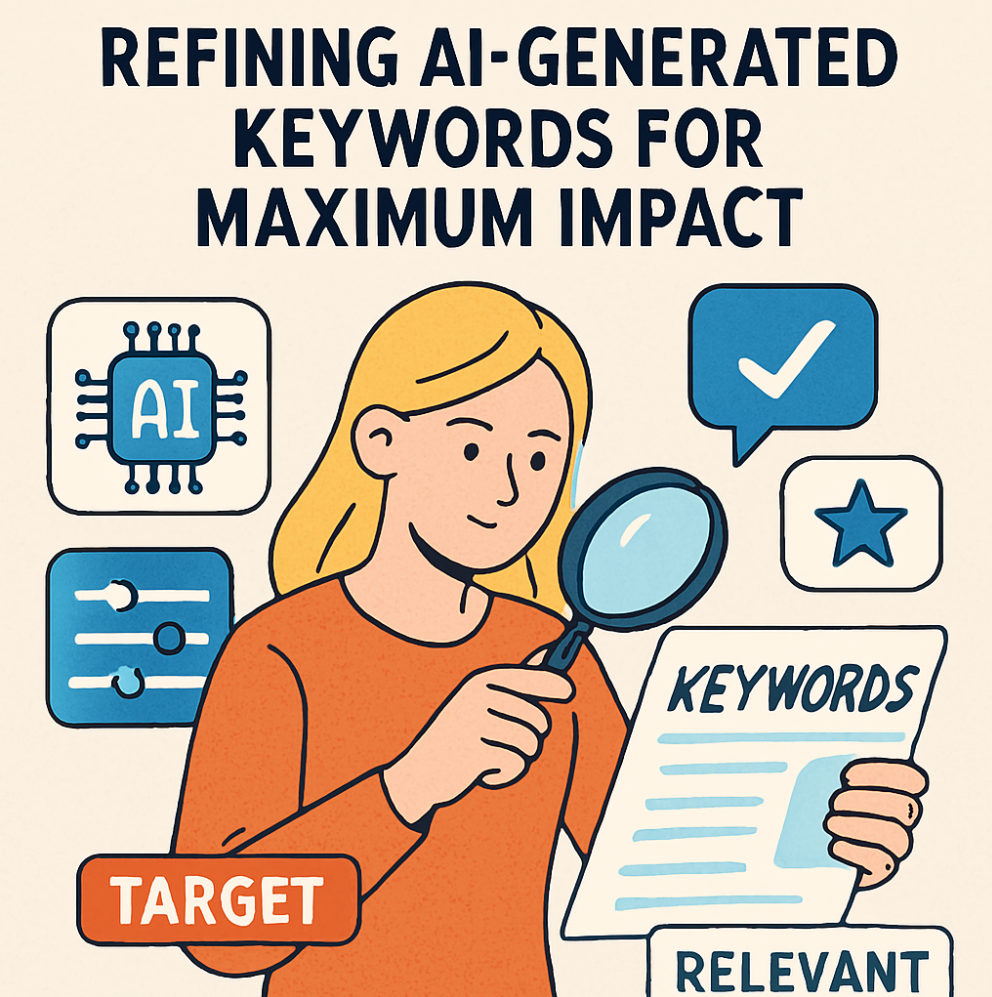
These AI-generated keywords need your human touch. Get creative. Finding questions or long-tail variations within these results is where some hidden gems often lie—a chance to address specific queries that may be ignored by competitors. Content that solves a problem or answers a specific question often ranks better because it’s more directly aligned with what users are seeking.
It’s also worth grouping related keywords into clusters. Instead of producing a one-off article for each keyword, you get to craft comprehensive content that covers a range of related topics. This approach not only helps establish authority in your niche but also enhances your chances to dominate search results.
The work done at this stage sets the tone for your SEO success. Refining keywords is like picking the perfect ingredients for a recipe. It’s all about balance. The right mix ensures that you offer something distinct and valuable, making your content more likely to resonate with both search engines and audiences alike. So remember, invest in this step—it pays back multifold in the long run.
Creating Content Plans: Achieving Topical Authority with Grouped Keywords
Once you’ve got your hands on a stellar set of refined keywords, it’s time to put them to good use. Crafting a cohesive content plan becomes your blueprint for building authority in your chosen topics. It’s about creating a well-structured web of articles that loop together perfectly, forming a narrative that pulls readers in and keeps them engaged.
Imagine spinning a tale through a series of interconnected articles. It took me a while to realize the power of focusing not just on individual keywords but on how they combine to tell a bigger story. By grouping related keywords, I’ve been able to produce focused, high-quality content that establishes topical authority—a key factor in ranking well on search engines.
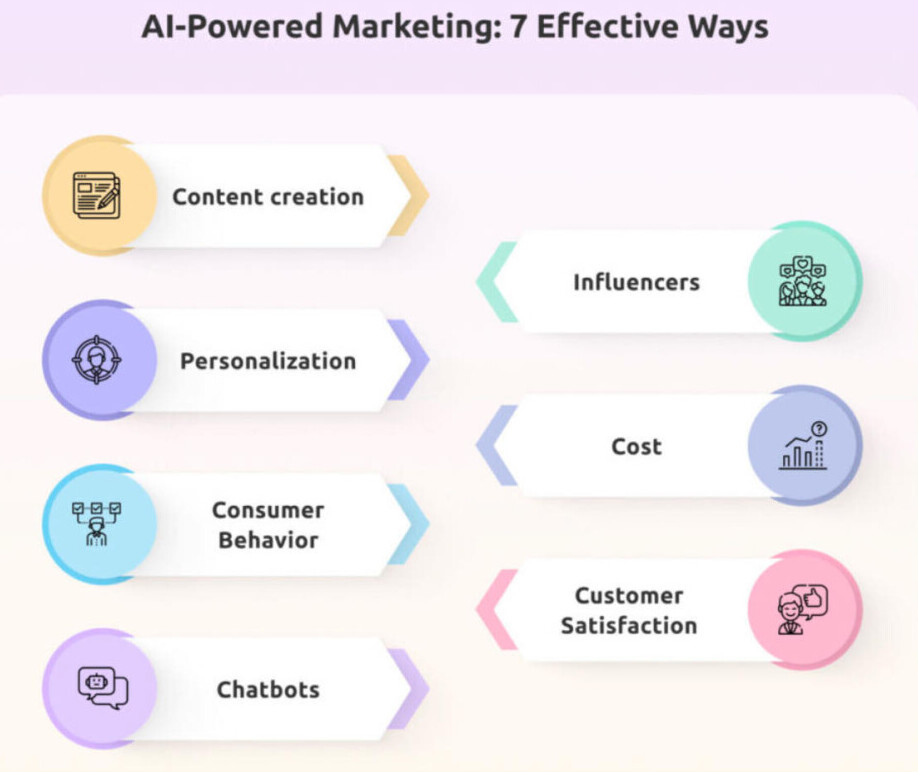
Let’s say you’re targeting a niche in sustainable travel. Instead of a standalone article targeting one keyword, you create a five-article series exploring different facets: eco-friendly accommodations, sustainable travel practices, travel gadgets, niche destinations, and eco-conscious travel apps. Each piece is interlinked with relevant keywords sewn through the narrative, giving readers and search engines a clear map of your expertise.
This method isn’t just beneficial for SEO; it’s a win for your readers too. When they see a well-organized set of resources, they’re more likely to stay on your site longer, delve into multiple articles, and view you as a trusted voice in the subject area.
The boost in engagement doesn’t only improve traffic metrics but also sends positive signals to search engines about your value. Consistently creating such content strengthens your brand and reinforces your credibility, placing your site as a go-to resource in your field. It’s about thinking bigger and beyond singular keyword targets, weaving an intricate web of information that stands the test of time.
Demystifying Results: Traffic & Earnings Breakdown from AI-Optimized Content
So you’ve got a slick content plan and some AI-enhanced keywords that fit like a glove. What comes next is what I think of as the payoff phase. That’s when you start to see the fruits of your labor blossom in the form of increases in traffic and hopefully, earnings that reflect your hard work.
I’ve noticed a fascinating pattern in how traffic behaves once a strategy like this unfolds. Typically, the uptick isn’t instant. Initially, it felt like watching paint dry, but patience is part of the SEO game! After about a month, there was this noticeable climb in visitor numbers. Those seemingly small bumps in traffic? Oh, they’re just the beginning, and with each aligned piece of content, those numbers grow steadily.
 Once your pages start ranking and driving consistent traffic, the earnings part gets intriguing. Estimated figures can vary, but it’s not uncommon to modestly turn hundreds into thousands in incremental monthly revenue, all thanks to properly optimized content. Keep in mind, these numbers depend heavily on your niche and the monetization strategies applied. Whether you’re pushing products or offering affiliate links, the focus should be on value-driven content that attracts and converts.
Once your pages start ranking and driving consistent traffic, the earnings part gets intriguing. Estimated figures can vary, but it’s not uncommon to modestly turn hundreds into thousands in incremental monthly revenue, all thanks to properly optimized content. Keep in mind, these numbers depend heavily on your niche and the monetization strategies applied. Whether you’re pushing products or offering affiliate links, the focus should be on value-driven content that attracts and converts.
Reflecting on these results, I can’t overstate the importance of measuring and analyzing data. Tools like Google Analytics provide insights into what’s hitting or missing the mark, enabling further refinement. Analyzing traffic sources, bounce rates, and conversion paths helps in tweaking those strategies to enhance outcomes.
High-performing content doesn’t just cater to algorithms; it’s designed for people looking to solve a problem or learn something valuable. Thus, continued engagement and adapting to feedback are crucial. Iteration based on this feedback loop is what keeps driving traffic upward and maintaining revenue streams. It’s all about staying on your toes.
Lessons from these analytics guide future decision-making. The focus is to create more of what works, reinforce strengths, and stay innovative, ensuring the success seen isn’t a fleeting moment but a stable, sustainable flow.
Building on Success: Tools, Templates, and Calls-to-Action
So, you’ve taken the dive into AI-powered keyword research and laid down a strong content foundation. Now, how do you keep the momentum going? It’s time to harness the resources and tools that have been part of your journey, and double down on what brought you success. Additionally, offering something valuable to your audience can help build lasting relationships and community.

Throughout my journey, I found creating templates or downloadable resources not only helped me streamline my own process but provided my audience with actionable tools they could appreciate and use. That’s why I crafted an AI Keyword Research Template as a freebie. This Google Sheet, coupled with a friendly walkthrough, can be a game-changer for anyone looking to improve their keyword game and rank better.
Engagement doesn’t stop there. Inviting readers to share experiences or insights about their own AI keyword research efforts can spark valuable discussions. Whether through comments, social media, or dedicated forums, these conversations foster a sense of community while keeping your content fresh and relevant.
And here comes the call to action—encourage your readers to download the template, subscribe to your newsletter, or follow your channels for ongoing tips, strategies, and updates. Solid CTAs not only drive immediate value but also create a funnel for continuous engagement.
I’ve seen firsthand how beneficial it is to stay in touch with readers, and it’s here you build lasting connections with your audience. Regular updates, sharing insights from new experiments, and offering tips ensure that they see your platform as not just a content source but as a useful, trusted guide on their SEO journeys.
Ultimately, the path to harnessing AI in affiliate marketing is dynamic and always worthy of adaptation. With the right tools, shared wisdom, and a community-driven approach, the realm of keyword research can be much more than a solitary task; it’s an avenue for growth, learning, and sustainable success for all involved.

Identifying low-competition affiliate niches has been one of the most rewarding yet challenging parts of my affiliate marketing journey. I’ve learned that real success often comes from digging deeper into sub-niches that others overlook, even if the search volume is modest. When I focused less on broad trends and more on underserved audiences with specific problems, conversions improved significantly. Keyword tools are helpful, but nothing beats manually analyzing the SERPs to see what type of content ranks, especially when spotting outdated or low-quality pages that present a real opportunity. This kind of niche selection has been a game-changer for building sustainable income streams.
Absolutely agree — diving into those overlooked sub-niches can be a total game-changer. It’s kind of wild how often people chase the big, high-volume keywords and miss out on those golden opportunities hiding in plain sight. I’ve noticed the same: when you really take the time to study the SERPs, especially for those low-comp terms, it’s like uncovering hidden gems. Outdated content, weak competition — that’s where you can really shine with value-packed content.
Have you found any surprising niches recently that turned out better than expected?